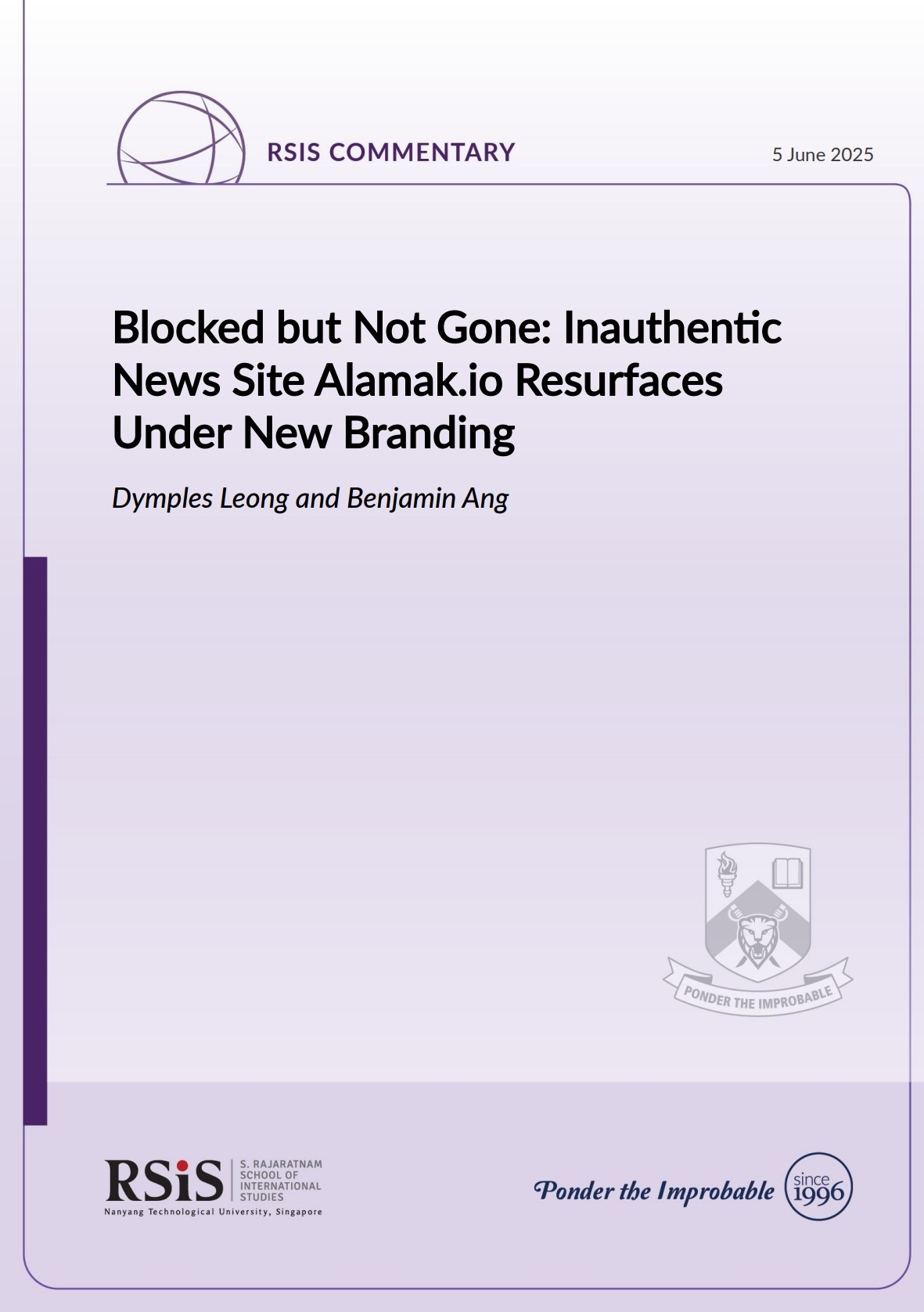05 June 2025
- RSIS
- Publication
- RSIS Publications
- Blocked but Not Gone: Inauthentic News Site Alamak.io Resurfaces Under New Branding
SYNOPSIS
Inauthentic websites may appear harmless but can potentially have malicious intent. Such websites are hard to distinguish from genuine ones and can re-emerge even after being blocked, so discernment and healthy scepticism are essential to mitigate the risks of information manipulation.

COMMENTARY
Singapore’s Ministry of Home Affairs (MHA) recently launched a campaign highlighting the risks of foreign interference. It highlighted “disinformation through social media” among the commonly used methods. One way this is carried out is by publishing information as “news” or “findings” that contain loaded narratives via inauthentic websites.
On 22 October 2024, the Singapore Ministry of Home Affairs identified Alamak.io as one of ten inauthentic websites set up by foreign actors that could be used to mount hostile information campaigns (HICs) against Singapore. Directions were issued under Section 16 of the Broadcasting Act 1994 to disable access to Alamak.io and the other nine websites for internet users in Singapore.
Risks Posed by Inauthentic Websites
This action drew public attention to the risks posed by inauthentic websites presenting themselves as lifestyle or news websites, which researchers from RSIS’ Centre of Excellence (CENS) explained in their policy report “Inauthentic Local Lifestyle and News Websites and the Challenge for Media Literacy” in October 2024.
The report revealed that Alamak.io presented itself as an independent website in Singapore covering local content, including articles and commentaries on socio-political issues. The website was found to lack transparent ownership and author attribution.
While there was no evidence at the time that Alamak.io was being used to manipulate and influence public sentiment with narratives detrimental to Singapore, there was a risk, as MHA had warned, that foreign actors could potentially use it to propagate false narratives and mislead audiences by launching HICs. Such attempts can potentially sway the target population’s sentiments to advance the interests of foreign actors.
Following the Singapore authorities’ direction to disable access to Alamak.io, CENS’ researchers noticed the appearance of a new website, Asianews.io. Using open-sourced tools, they found that Alamak.io and Asianews.io shared similar characteristics.
Exposing Asianews.io as an Inauthentic Website
Several indicators suggested that the operators of AsiaNews.io and Alamak.io are the same. To investigate AsiaNews.io, open-source intelligence (OSINT) techniques were once again harnessed. Technical details of the open-source analysis are available here.
It was found that Asianews.io appeared to be a new standalone site created on 25 October 2024, shortly after Alamak.io was taken offline in Singapore and three days after MHA issued its press release on “Ten Inauthentic Websites Blocked for Potential Threat of Being Used to Mount Hostile Information Campaigns Against Singapore”.
The oldest article on Asianews.io was dated 30 March 2023, even though the website was created only on 25 October 2024, a dead giveaway of its inauthenticity.
Both Asianews.io and Alamak.io shared and were associated with domains hosted on the same IP address. Other domains associated with the IP address included 5plus1.ru, the same Russian communications agency linked to Alamak.io, as identified in the RSIS report. Furthermore, both websites shared the same Yandex Metrika ID, an analytical service which tracks and reports web traffic.
While Alamak.io positioned itself predominantly as a Singapore-centric news and lifestyle website, Asianews.io appears to have pivoted from this approach, with articles more focused on news in Southeast Asia. It was observed that articles containing news or topics related to Singapore were mostly about current affairs. The Russian Ambassador to Singapore wrote several articles about Singapore, which appeared identical to those found on Alamak.io before it was taken down.
The Need for Vigilance
AI-generated news and information websites have disseminated propaganda, misinformation, and disinformation worldwide. In 2024, several Russian websites were reportedly mimicking authentic US news websites to disseminate propaganda by embedding them in content related to crime, politics, and cultural topics.
As the RSIS policy report warned, Singapore is vulnerable to foreign interference through online hostile information campaigns (HICs). Inauthentic websites presenting themselves as news and current affairs websites can be used maliciously to influence public sentiments, weaken governments, institutions, and policies by eroding trust, or spreading divisive narratives to increase societal polarisation.
While Asianews.io’s content does not appear hostile to Singapore, its creation and activation in the immediate aftermath of Alamak.io’s deactivation raises many questions. There was no known response from the publishers of Alamak.io, but the MHA’s action seems to have prompted them to respond by rebranding rather than shutting down.
This does not mean that MHA’s action was ineffective. On the contrary, its blocking of the ten inauthentic websites in October 2024 appears to have stopped the people behind them from targeting Singapore directly. However, this also shows that threat actors will continue to adapt to evade countermeasures.
In its current form, the Asianews.io’s website does not appear to cross any threshold of direct risk to Singapore or run afoul of any Singapore laws. However, since the publisher remains active in a rapidly changing information environment, we should continue to be vigilant when consuming online content and be wary of such inauthentic websites and the common tactics used for information manipulation.
About the Authors
Benjamin Ang is a Senior Fellow and Head of the Centre of Excellence for National Security (CENS) at S. Rajaratnam School of International Studies (RSIS), Nanyang Technological University, Singapore. He is also the Head of Digital Impact Research at RSIS and leads the Future Issues in Technology programme. Dymples Leong is an Associate Research Fellow at CENS.
Other publications on this topic
How a Network of Inauthentic Websites Could Be a Threat to Singapore
Networks of Inauthentic News Sites and the Risk of Hostile Information Campaigns in Singapore
Inauthentic Local Lifestyle and News Websites and the Challenge for Media Literacy
Blocked but Not Gone: Inauthentic News Site Alamak.io Resurfaces Under New Branding
SYNOPSIS
Inauthentic websites may appear harmless but can potentially have malicious intent. Such websites are hard to distinguish from genuine ones and can re-emerge even after being blocked, so discernment and healthy scepticism are essential to mitigate the risks of information manipulation.

COMMENTARY
Singapore’s Ministry of Home Affairs (MHA) recently launched a campaign highlighting the risks of foreign interference. It highlighted “disinformation through social media” among the commonly used methods. One way this is carried out is by publishing information as “news” or “findings” that contain loaded narratives via inauthentic websites.
On 22 October 2024, the Singapore Ministry of Home Affairs identified Alamak.io as one of ten inauthentic websites set up by foreign actors that could be used to mount hostile information campaigns (HICs) against Singapore. Directions were issued under Section 16 of the Broadcasting Act 1994 to disable access to Alamak.io and the other nine websites for internet users in Singapore.
Risks Posed by Inauthentic Websites
This action drew public attention to the risks posed by inauthentic websites presenting themselves as lifestyle or news websites, which researchers from RSIS’ Centre of Excellence (CENS) explained in their policy report “Inauthentic Local Lifestyle and News Websites and the Challenge for Media Literacy” in October 2024.
The report revealed that Alamak.io presented itself as an independent website in Singapore covering local content, including articles and commentaries on socio-political issues. The website was found to lack transparent ownership and author attribution.
While there was no evidence at the time that Alamak.io was being used to manipulate and influence public sentiment with narratives detrimental to Singapore, there was a risk, as MHA had warned, that foreign actors could potentially use it to propagate false narratives and mislead audiences by launching HICs. Such attempts can potentially sway the target population’s sentiments to advance the interests of foreign actors.
Following the Singapore authorities’ direction to disable access to Alamak.io, CENS’ researchers noticed the appearance of a new website, Asianews.io. Using open-sourced tools, they found that Alamak.io and Asianews.io shared similar characteristics.
Exposing Asianews.io as an Inauthentic Website
Several indicators suggested that the operators of AsiaNews.io and Alamak.io are the same. To investigate AsiaNews.io, open-source intelligence (OSINT) techniques were once again harnessed. Technical details of the open-source analysis are available here.
It was found that Asianews.io appeared to be a new standalone site created on 25 October 2024, shortly after Alamak.io was taken offline in Singapore and three days after MHA issued its press release on “Ten Inauthentic Websites Blocked for Potential Threat of Being Used to Mount Hostile Information Campaigns Against Singapore”.
The oldest article on Asianews.io was dated 30 March 2023, even though the website was created only on 25 October 2024, a dead giveaway of its inauthenticity.
Both Asianews.io and Alamak.io shared and were associated with domains hosted on the same IP address. Other domains associated with the IP address included 5plus1.ru, the same Russian communications agency linked to Alamak.io, as identified in the RSIS report. Furthermore, both websites shared the same Yandex Metrika ID, an analytical service which tracks and reports web traffic.
While Alamak.io positioned itself predominantly as a Singapore-centric news and lifestyle website, Asianews.io appears to have pivoted from this approach, with articles more focused on news in Southeast Asia. It was observed that articles containing news or topics related to Singapore were mostly about current affairs. The Russian Ambassador to Singapore wrote several articles about Singapore, which appeared identical to those found on Alamak.io before it was taken down.
The Need for Vigilance
AI-generated news and information websites have disseminated propaganda, misinformation, and disinformation worldwide. In 2024, several Russian websites were reportedly mimicking authentic US news websites to disseminate propaganda by embedding them in content related to crime, politics, and cultural topics.
As the RSIS policy report warned, Singapore is vulnerable to foreign interference through online hostile information campaigns (HICs). Inauthentic websites presenting themselves as news and current affairs websites can be used maliciously to influence public sentiments, weaken governments, institutions, and policies by eroding trust, or spreading divisive narratives to increase societal polarisation.
While Asianews.io’s content does not appear hostile to Singapore, its creation and activation in the immediate aftermath of Alamak.io’s deactivation raises many questions. There was no known response from the publishers of Alamak.io, but the MHA’s action seems to have prompted them to respond by rebranding rather than shutting down.
This does not mean that MHA’s action was ineffective. On the contrary, its blocking of the ten inauthentic websites in October 2024 appears to have stopped the people behind them from targeting Singapore directly. However, this also shows that threat actors will continue to adapt to evade countermeasures.
In its current form, the Asianews.io’s website does not appear to cross any threshold of direct risk to Singapore or run afoul of any Singapore laws. However, since the publisher remains active in a rapidly changing information environment, we should continue to be vigilant when consuming online content and be wary of such inauthentic websites and the common tactics used for information manipulation.
About the Authors
Benjamin Ang is a Senior Fellow and Head of the Centre of Excellence for National Security (CENS) at S. Rajaratnam School of International Studies (RSIS), Nanyang Technological University, Singapore. He is also the Head of Digital Impact Research at RSIS and leads the Future Issues in Technology programme. Dymples Leong is an Associate Research Fellow at CENS.
Other publications on this topic
How a Network of Inauthentic Websites Could Be a Threat to Singapore
Networks of Inauthentic News Sites and the Risk of Hostile Information Campaigns in Singapore
Inauthentic Local Lifestyle and News Websites and the Challenge for Media Literacy
Blocked but Not Gone: Inauthentic News Site Alamak.io Resurfaces Under New Branding





